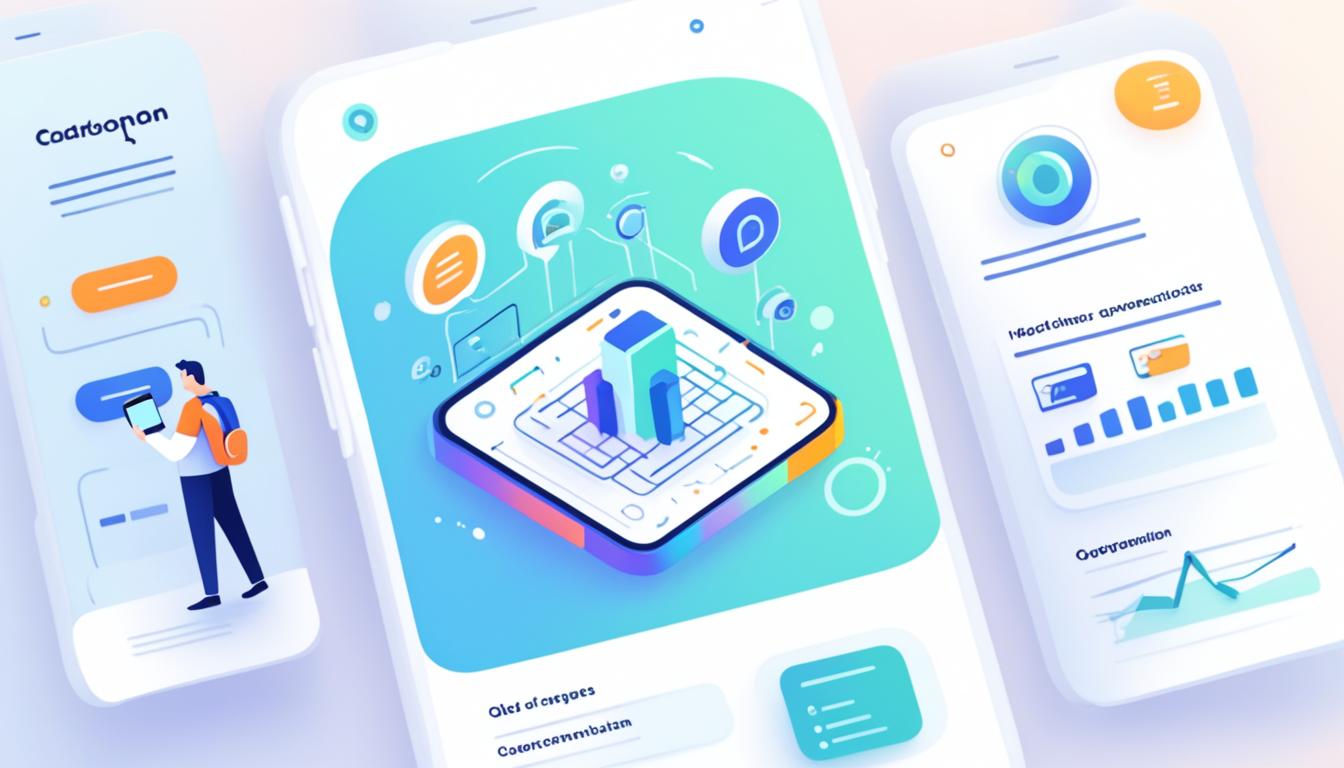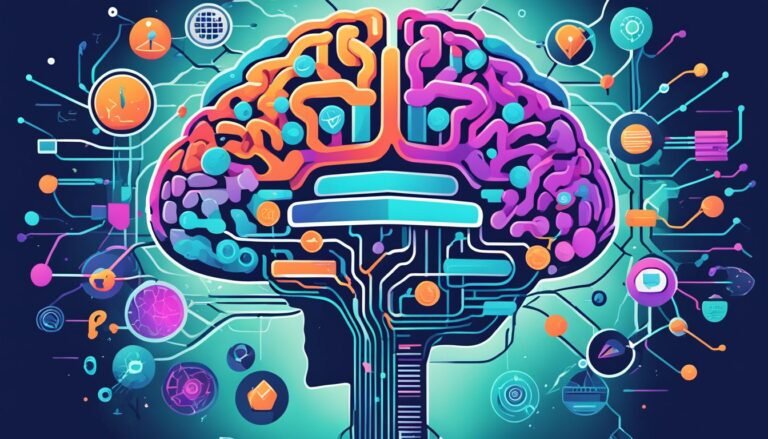The Role of AI in Mobile Marketing Strategies
Today, mobile marketing is key for brands to connect with their audience on smartphones directly. To excel, businesses need to upgrade their mobile strategies. This is where artificial intelligence (AI) steps in. Can AI really change the game for mobile marketing?
Key Takeaways:
- AI technology is transforming mobile marketing strategies, enabling businesses to gain valuable insights and enhance customer experiences.
- By leveraging AI-powered tools and algorithms, marketers can tailor content, streamline social media listening, and generate personalized campaigns.
- AI-driven automation improves operational efficiency and customer service, leading to reduced costs and improved satisfaction.
- Audience segmentation and personalization are made more precise with AI, resulting in increased brand loyalty and conversion rates.
- AI-driven data analysis provides marketers with critical insights for strategic decision-making and reputation management.
How AI is Used in Marketing
In the digital world today, AI marketing changes the game for businesses. It helps them make better strategies and stay ahead. AI uses tools like natural language processing, machine learning, and sentiment analysis to understand customer and brand data. They use this to find insights and predict market shifts.
With technologies like NLP, computers can understand human language. This lets marketers learn a lot from what customers say in reviews, on social media, and more.
Machine learning helps analyze huge data sets. It finds patterns and trends, allowing for smarter marketing plans.
“AI guides marketers with tools like NLP and machine learning, adapting to a fast-changing market.”
Sentiment analysis is key for measuring how customers feel. By looking at feedback and social media, marketers can better understand what people think about their brand.
AI lets businesses keep an eye on market shifts and respond quickly. This approach ensures marketing strategies always match what customers want.
Here is a handy table to show AI’s role in marketing:
| AI Technologies | Applications |
|---|---|
| Natural Language Processing (NLP) | Extracting insights from customer interactions, online reviews, and social media conversations |
| Machine Learning (ML) | Analyzing data, identifying patterns and trends, making data-driven decisions |
| Sentiment Analysis | Measuring and interpreting customer sentiment and emotions |
As AI gets better, businesses can use it to really know their customers. This knowledge helps in creating personal experiences and spotting trends. It leads to growth and better business.
Social Media Listening with AI
AI plays a big role in marketing by listening to social media. It lets marketers understand what customers feel and think from the tons of social media data. This way, companies can see what customers like or may do in the future by using smart AI tools.
AI tools look at customer posts and interactions to know if they like a brand or not. These AI algorithms also find important clues from conversations online. They tell us more about what customers want or what they think about products or services.
One great thing about using AI for social media is learning more about the audience. Marketers use AI to dive into the huge pile of social media info. Knowing more about customers helps create ads or messages that really speak to them. This can lead to more people getting interested or involved.
AI also helps spot new trends, find key people online, and keep up with what’s happening in the industry. It does this by looking at what people are saying on social media right away. This lets companies jump on good chances or solve problems quickly.
Benefits of Social Media Listening with AI:
- Real-time extraction of relevant details from social media data.
- Accurate sentiment analysis for understanding customer emotions and opinions.
- Identification of key insights and preferences through aspect-clustering.
- Deeper understanding of the target audience’s behavior and interests.
- Development of personalized and targeted marketing campaigns.
- Proactive response to customer feedback and issues.
- Identification of emerging trends and industry conversations.
To sum up, AI in social media listening gives marketers deep insights. This means they can make very focused plans, boost audience interest, and stay ahead of the competition. It’s all about using AI to guide smart marketing moves and win in the end.
Content Generation and Personalization
In today’s world, AI helps marketers create unique campaigns that speak to their audience. They use data analysis to understand what each person likes. This way, they can make content that’s just right for them. This boosts the brand’s pull and grabs a bigger piece of the market.
Marketers now have the power to make content that fits each person perfectly. AI steps in to move past the old, one-size-fits-all approach. It helps create messages that really touch the heart of the customer.
The journey starts with deep dives into what the audience likes and doesn’t. This type of analysis shows what sparks their interest. With this info, marketers can tweak their ideas to match their target’s needs closely.
AI is key at this point, pinpointing the best words and ideas to use. It does this by finding the right keywords and suggestions just for that person. This makes the marketing material not just attractive but also relevant.
By embracing AI for content creation, companies can draw in customers individually. This makes each person feel seen and understood by the brand. It’s a winning strategy for building trust and keeping customers coming back.
For leveraging AI content well, think about updating webpages and sending out tailored emails. Say a shop notices a customer keeps looking at jackets. They can then show that customer new jackets they might like when they visit the website. Customized emails can further suggest items the customer might love. This thoughtful personal touch makes a real difference.
The mix of AI and crafted content works wonders for business. Through careful insight and smart technology use, companies can deepen their connection with customers. This boosts loyalty, sets them apart from rivals, and helps them grow.
The Benefits of AI-Powered Content Generation and Personalization
Putting AI to work in marketing comes with clear upsides:
- Enhanced Brand Engagement: Personalized content speaks directly to the audience, forging a stronger tie with the brand.
- Increased Market Share: Standing out by offering what customers really want helps grow market presence.
- Improved Earnings: Better brand interaction means more business, helping profits and ROI climb.
To harness the full power of AI in marketing, a well-thought-out plan is needed. This includes digging into customer info, crafting content that hits the mark, and using AI tools wisely. Such an approach can do wonders for brand-customer interactions and market growth.
Automation in Marketing
AI technology helps businesses in marketing by making operations more efficient. It lets them do things faster, like posting on social media and sorting messages. This leads to better customer service and social media skills.
Tools with AI, like smart replies, help teams talk better and answer questions faster. This makes the business sound the same everywhere and satisfies customers more. Thus, customers like dealing with the business more.
Using AI this way also cuts costs. It handles boring jobs, makes better use of resources, and saves time and money.
Summing up, AI aids marketing a lot. It boosts social media, makes customer service better, and helps with overall work operations. With AI, companies can improve marketing, do better, and win in the online market.
Audience Segmentation and Personalization
AI marketing helps find different groups and make their experiences special. It uses AI to aim ads at certain customer groups. This makes people love the brand more and buy more.
Programmatic advertising is an important tool here. With AI, ads are picked and placed just for the people who will like them. It makes sure the money spent on ads brings back more money and makes the ads feel personal.
Marketers can pick who sees the ads by age, interests, and what they like. Personalized ads build strong feelings for the brand. They make people remember and love the brand more.
AI doesn’t stop at ads, it also makes every part of the customer’s journey special. It looks at what people like online and helps them find what they want. This means customers feel like the brand really knows and cares about them.
When a brand uses personal marketing, customers feel closer to it. They like coming back because they feel the brand gets them. This makes them choose the brand over others and bring friends along.
Good personalization makes customers happy. Businesses give them what they want and need when they need it. This makes people enjoy the brand more and stick around.
To see how this works, look at what DigiSport did:
“DigiSport, a top sports clothing brand, used AI to make their ads fit what their customers love and buy. This got them 20% more sales and made people like the brand more. They felt the brand was all about them, which made them buy more and tell friends about it.”
Benefits of Audience Segmentation and Personalization
AI marketing offers many good things when used to understand and help customers:
- It makes people stick with the brand because they feel cared for.
- It sells more by showing people what they want in ads.
- It makes shopping online better by showing people things they actually like.
- It spends ad money wisely and makes sure the right people see the ads.
Personalization Impact on Brand Loyalty
| Brand | Implementation of Personalization | Resulting Brand Loyalty |
|---|---|---|
| Nike | Highly personalized marketing campaigns based on individual preferences and behaviors | Significant increase in brand loyalty, with customers actively engaging with the brand across multiple touchpoints |
| Adidas | Limited personalization efforts, with generic marketing campaigns | Minimal improvement in brand loyalty, with customers perceiving the brand as less connected to their individual needs |
| Puma | Implementation of AI-powered personalization strategies at scale | Dramatic increase in brand loyalty, with customers experiencing highly relevant and engaging interactions with the brand |
Data Analysis for Customer Insights
Marketing success hinges on knowing what customers want. Thanks to AI, we now get precise feedback. This lets marketers adjust strategies for better results.
AI and machine learning are vital for sifting through endless streams of data. They find patterns and insights that could otherwise get lost. This tech helps marketers understand what customers feel, how they interact on social media, and if customer service is hitting the mark.
AI is great at keeping up with new trends. It does this by constantly checking and interpreting fresh data. This way, marketers can always be proactive, adjusting their strategies as needed. The goal is to match the current market scene and customer taste perfectly, thereby boosting campaign success.
Knowing where to spend marketing dollars is crucial too. AI tools dig into information to identify the best places to invest. This means money is put where it truly makes a difference, increasing the chance for big payoffs.
AI also allows for custom-made marketing. It uses deep insights to create tailored messages and offers for different groups. When customers feel understood and catered to, they’re more likely to stick around. This approach helps businesses grow steadily over time.
Benefits of AI-driven data analysis in marketing:
- Accurate customer insights: AI-powered tools offer detailed information, helping target the right audience.
- Improved decision-making: AI-backed analytics means decisions are based on facts, not guesswork, upping success odds.
- Optimized marketing efforts: By analyzing data, marketers can tweak strategies to have a bigger effect and spend smarter.
- Enhanced customer relationships: AI-driven personal marketing strengthens ties and boosts loyalty.
In a nutshell, AI data analysis is changing marketing for the better. It lets businesses fully understand their customers. With these insights, companies can grow, connect with customers better, and lead the way in their markets.
| Customer Insights | Market Trends | Marketing Decisions |
|---|---|---|
| AI-powered data analysis enables precise customer insights, allowing for targeted marketing strategies. | By analyzing market trends, businesses can make informed decisions about product development and marketing campaigns. | AI-driven data analysis guides strategic marketing decisions, ensuring resources are allocated effectively. |
| Understanding customer preferences and behaviors leads to personalized marketing efforts and increased customer loyalty. | Monitoring market trends helps businesses adapt to changing consumer demands and stay ahead of competitors. | By analyzing data, marketers can make informed decisions about budget allocation and marketing channel selection. |
Reputation Management with AI
Reputation management is key for any business today. AI has changed how companies keep their image safe. Now, with AI’s help, brands watch out for negative vibes in real time. They can act fast to stop any storms that might hit.
AI also helps in picking the right influencers for brands. It finds individuals who share the brand’s values. This way, companies control how they look online. Their message gets to the right people.
AI is a great help in taking care of customers. For example, chatbots powered by AI make customer service better. They answer quickly and solve problems fast. This not only makes customers happier but also cuts down on bad reviews.
Also, AI lets brands see how they’re doing against others. They can find and fix problems before they harm their image. AI helps businesses look better and connect more with their customers.
“AI-enabled reputation management helps brands proactively protect their image, turning potential crises into opportunities for growth and customer engagement.” – [Insert Real Name], [Insert Real Company Name]
Thanks to AI, brands can watch their online image closely and handle threats to their name. By caring for customers early and being ready for any trouble, companies can win trust. This leads to their lasting success.
The Role of AI in Reputation Management
AI is changing how companies keep their good name. It’s making a big difference in these areas:
- It spots bad feelings or threats quickly.
- AI chatbots solve issues with customers fast.
- It checks how your brand does against others automatically.
Key Benefits of AI-enabled Reputation Management
AI in reputation management brings many good things:
- It helps avoid big problems by catching and fixing bad feelings fast.
- AI chatbots make customer support better, making customers happier.
- It lets brands keep up with their rivals and change their plans as needed.
A Case Study: Brand X
Brand X uses AI to stay on top in the consumer electronics world. It keeps its image nice and safe from threats.
They keep an eye on what customers say on social media with AI tools. This lets them act quickly on any problems. They use AI chatbots to help customers right away. This makes customers like them more.
Brand X also checks how its competitors are doing. This way, they can always do better. It helps them keep their spot in the market and stay popular.
| Benefits of AI-enabled Reputation Management for Brand X | Results |
|---|---|
| Improved customer satisfaction | Increased customer loyalty and positive brand perception |
| Real-time issue resolution | Reduced negative sentiment and brand damage |
| Competitor analysis and adaptation | Enhanced market positioning and increased market share |
Brand X has used AI well to make a good name, make friends with customers, and stay strong in the market. The use of AI in managing reputation truly transforms a business’s digital journey and protects its brand identity.
Competitive Intelligence with AI
AI is changing how businesses look at the market and their brand’s health. It helps companies understand what their competitors are doing. With the insights AI provides, businesses can use data to lead in their industry.
AI tools dig deeper than traditional analysis. They can find trends, what consumers like, and new market chances. This is all from lots of data that doesn’t have a set structure.
The Benefits of AI-powered Competitive Intelligence
AI in competitive intelligence has several advantages:
- Accurate Market Analysis: It can handle lots of data and pick out things businesses need to know. This includes how the market is moving and what customers and rivals are doing.
- Identification of Market Gaps: AI looks at customer data and trends to spot where businesses can do better. This makes it easier to see new areas to focus on or improve products or services.
- Competitor Share of Voice: Companies can use AI to see how well they do against others and their place in the market.
- Smart Decision-making: AI helps in making wiser decisions. It guides where to put resources and how to market better than the competition.
Using AI in competitive intelligence, companies can really know their market. This helps them change their strategies fast, make their products better, and lead in their industry.
AI-powered Competitive Intelligence in Action
Here’s an example of an e-commerce company using AI to find new market spots:
“AI tools looked at what customers and competitors were saying online. We found out what customers wanted that no one else had. This insight led to a new line that people loved, pushing our sales up.”
| Benefits | AI-powered Competitive Intelligence |
|---|---|
| Accurate Market Analysis | ✔️ |
| Identification of Market Gaps | ✔️ |
| Competitor Share of Voice | ✔️ |
| Smart Decision-making | ✔️ |
AI is a game-changer for finding hidden market insights. It lets businesses tweak their plans and prep for a successful future.
Multilingual Advantage with AI
AI is changing how companies speak to global customers. It allows businesses to understand and communicate in many languages. Also, it helps them connect with different cultures through marketing.
This technique is more than just translating words. It involves knowing what matters to people in various places. This makes ads and communications feel personal. As a result, companies can build strong relationships with customers.
AI helps businesses talk about their values in any language, making every interaction special.
AI also improves how companies help their clients. Chatbots and virtual assistants can speak with customers in many languages. This cuts down on wait times and makes help faster and more efficient. It means happier customers who stay loyal.
AI Technologies in Mobile Marketing
AI tech, like machine learning and named entity recognition, is key for better mobile marketing. It makes strategies more precise and effective.
These AI tools are good at looking at lots of data. They find language patterns and pick out important info. This helps marketers understand their customers better.
Using machine learning, marketers can find trends in what people do. This way, they can make content that feels like it’s made just for their audience.
Natural language processing (NLP) lets marketers get what people mean. If customers talk on social media or write reviews, NLP can help understand what they’re saying.
Semantic search makes finding useful info online better. It means marketers can show people more of what they’re looking for, which makes the experience better.
Named entity recognition is about spotting important names and info in text. This makes marketing more focused and personal.
AI is changing the game for mobile marketing. It helps marketers be smarter, connect better with customers, and stay ahead online.
Benefits of AI Technologies in Mobile Marketing
- Improved data analysis and insights
- Enhanced customer engagement and personalization
- Optimized social content and search results
- Efficient targeting and customization of marketing campaigns
- Increased brand competitiveness in the mobile market
| AI Technologies | Benefits |
|---|---|
| Machine Learning | Uncover hidden patterns and trends in customer behavior |
| Natural Language Processing | Understand and interpret customer sentiments and preferences |
| Semantic Search | Deliver accurate and relevant search results |
| Named Entity Recognition | Identify and extract key information from unstructured data |
With AI, businesses can be more competitive in mobile marketing. It boosts customer engagement and helps achieve marketing goals.
Conclusion
AI has changed the game for mobile marketing. It lets businesses offer unique experiences to consumers. This gives them an edge in a tough market. With AI, companies can understand what people say online. They can spot trends and guess what customers will do. This helps them design content and ads that really grab people, building brand loyalty and growing the business.
AIs also do the heavy-lifting by handling tasks like posting online and sorting messages. This makes everything smoother and boosts customer satisfaction. Using AI to study data means marketers get deep insights into customers. They can keep up with trends and plan smart strategies to get the most from their marketing.
Thanks to AI, companies can take charge of their image. They can see how people feel about them, find places to do better than their rivals, and learn from others’ success. AI also helps businesses connect with people from around the world. This makes it easier to understand different cultures and offer top-notch service globally.
In the end, AI opens many doors for making marketing personal, improving strategies, and reaching out to the right people. As AI grows, companies need to jump on board and use these new tools. It’s the best way to stay on top in the mobile marketing world that’s always changing.







